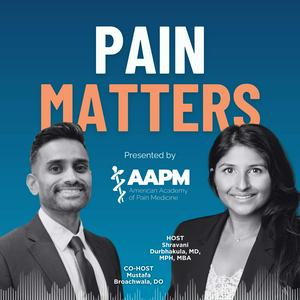In Response: BMJ Interventional Spine Guidelines 2025
Join Executive Producer and Host Shravani Durbhakula, MD, MPH, MBA, and Co-Host Mustafa Broachwala, DO, for a pivotal episode of the Pain Matters Podcast where we address the recent BMJ publication, “Common interventional procedures for chronic non-cancer spine pain: a systematic review and network meta-analysis of randomized trials,” and the associated guideline. Steven Cohen, MD, Feinberg School of Medicine Northwestern University, Lynn R. Kohan, MD, University of VA Medical School, Zachary McCormick, MD, University of Utah, Nathaniel M. Schuster, MD, University of California, San Diego, Daniel Larach, MD, MS, MA, Vanderbilt University, Hance Clarke, MD, FRCPC, PhD, University of Toronto and President of the Canadian Pain Society, Hemant Kalia, MD, MPH, FIPP, Invision Health, and present diverse perspectives on the publication’s claims and the systematic review and meta-analysis methods behind it.In this episode, you’ll learn:The podcast underlines the necessity for comprehensive, unbiased systematic reviews and meta-analyses to inform clinical guidelines effectively.Experts caution against the misinterpretation of studies and the potential consequences for policy and access to interventional pain procedures.Advocates call for unified efforts in the pain medicine community to pursue legislative and regulatory reforms that align with current evidence and patient needs.The conversation underscores the pivotal role of personalized patient care and clinically validated techniques in improving outcomes and preserving practice legitimacy.The podcast highlights the risk of reducing access to viable interventional pain treatments if skewed interpretations of data shape healthcare policies.Tune in to discover how these leading experts address the controversies, advocate for robust clinical evidence, and highlight the urgent need for unified advocacy in shaping practical, patient-centered guidelines.Be sure to subscribe so you don’t miss our next episode.Reference: Wang X, Martin G, Sadeghirad B, Chang Y, Florez I D, Couban R J et al. Common interventional procedures for chronic non-cancer spine pain: a systematic review and network meta-analysis of randomised trials BMJ 2025; 388 :e079971 doi:10.1136/bmj-2024-079971
